Trump’s Disdain for Puerto Rico Should Be His Undoing
His “otherizing” of the U.S. colony should not obscure the fact he has failed Americans suffering through the aftermath of hurricanes.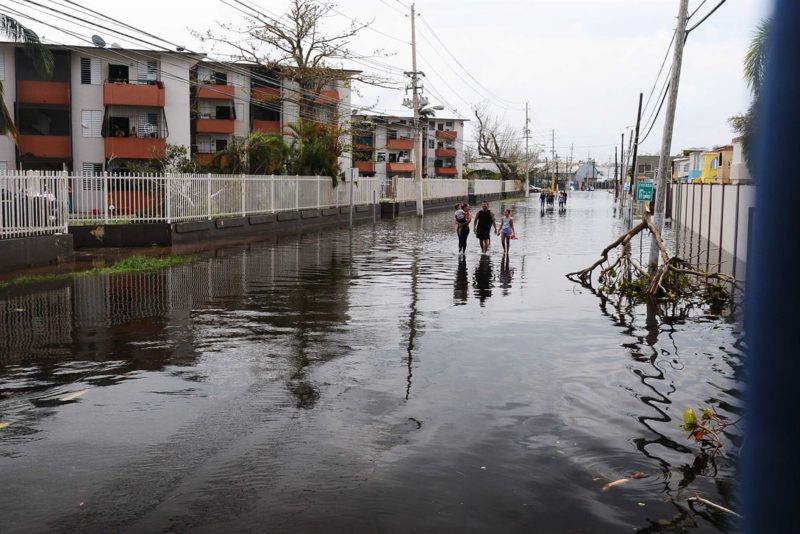 Puerto Rican residents wade through the flooded streets of San Juan in September 2017 in the wake of Hurricane Maria. (Sgt. Jose Ahiram Diaz-Ramos / Puerto Rico National Guard)
Puerto Rican residents wade through the flooded streets of San Juan in September 2017 in the wake of Hurricane Maria. (Sgt. Jose Ahiram Diaz-Ramos / Puerto Rico National Guard)
Puerto Rico’s death toll of about 3,000 from Hurricanes Irma and Maria in 2017 ought to be the biggest strike against President Donald Trump. The majority of deaths on the island occurred in the days and weeks following the hurricanes, largely due to inadequate health care and the admitted failures of the Federal Emergency Management Authority (FEMA), suggesting that these were preventable deaths. And yet to Trump, Puerto Rico is the recipient of fantastical amounts of undeserved money.
In many ways, Trump sees the U.S. colony as a personification of his usual enemies. Puerto Rico is brown skinned, non-English speaking, foreign, Democratic, and poor—whether or not any or all of these things are entirely true. Therefore, if it does not accept his patronizing gestures with undying gratitude, it deserves nothing but disdain.
That disdain has been apparent right from the start, most notably during Trump’s post-hurricane paper towel-throwing exercise in 2017 and in his denials of the extent of the hurricane-related death toll. It was also on full display earlier this week during his Monday night tweet-storm. In an error-filled statement, Trump tweeted that “Puerto Rico got far more money than Texas & Florida combined, yet their government can’t do anything right, the place is a mess—nothing works.” He also said, “Puerto Rico got 91 Billion Dollars for the hurricane, more money than has ever been gotten for a hurricane before.” Trump—who, like his base, feels his manhood is deeply threatened by strong women of color leaders—called San Juan Mayor Carmen Yulin Cruz “crazed and incompetent.” He then spoke of himself in the third person, bombastically asserting that “The best thing that ever happened to Puerto Rico is President Donald J. Trump.”
Multiple news outlets exposed his $91 billion figure and claims that Puerto Rico received more money than any other region for a hurricane as flat-out lies. No one is quite sure where Trump conjured up the number, but some have speculated that he confused the total amount of damage suffered by Puerto Rico from the 2017 storms with the amount it has actually received. The Washington Post reported that it “is a combination of $41 billion that’s been set aside for recovery combined with $50 billion expected to be spent over the life of the recovery effort.” Regardless of where he got the figure, the difference between reality and Trump’s fiction ironically encompasses Puerto Rico’s actual need.
Trump’s claim that Puerto Rico was given more money than any hurricane-affected region has ever been granted is also erroneous. Federal funds to Louisiana after the 2005 Hurricane Katrina totaled about $120 billion.
The president’s bizarre comments come as the Senate failed to pass two bills on disaster relief this week hinging on expanding Puerto Rico’s food stamp program. Trump has privately told his Republican colleagues that he will not support additional funding going to Puerto Rico, proving that the consequences of his defiant misinformation have a real-world impact. Eric LeCompte, executive director of Jubilee USA, put it in these terms in an interview: “Puerto Rico has become kind of a bargaining chip to move forward proposals.” He explained that Trump considered “taking aid that was committed for Puerto Rico in order to build or strengthen the border wall.”
What Trump also exposed in his series of tweets was how he has clearly “otherized” Puerto Rico. In his complaints against Senate Democrats for voting down the disaster relief bill for other states that he backed, the president tweeted: “Puerto Rico has already been scheduled to receive more hurricane relief funding than any ‘place’ in history.” His use of the quotation marks in referring to Puerto Rico as a “place” is suggestive of his uncomfortable attitude toward the U.S. colony. He also complained about how Puerto Rico’s politicians “only take from USA,” implying that the island was not part of this country, rather an outsider leeching from the federal treasury. It’s not just Trump. White House Deputy Press Secretary Hogan Gidley twice referred to Puerto Rico as “that country” during an interview this week. LeCompte explained to me that “Unfortunately, a lot of Americans don’t understand that people who are living in Puerto Rico, people born in Puerto Rico, are U.S. citizens.” It seems as though this ignorance may extend to the White House under Trump.
Trump has also decided that Puerto Rico’s governor does not deserve his attention, and in a manner that can only be described as utterly juvenile, as he has been actively avoiding Gov. Ricardo Rosselló. Rosselló responded by saying such behavior was “below the dignity of a sitting President” and “irresponsible, regrettable and, above all, unjustified.”
The fact that about 3,000 Americans died on Trump’s watch in Puerto Rico should be at least as large a stain on his presidency as Hurricane Katrina was on George W. Bush’s legacy. That 2005 tragedy resulted in 1,833 deaths and was seen as the lowest point of Bush’s domestic record. But amid the endless fallout of Trump’s train wreck of a presidency, there has been very little accountability for Puerto Rico’s hurricane deaths. And now Trump has gone further in trying to rewrite history, making up facts and figures to suit his agenda, and shirking his responsibility to even meet with Puerto Rico’s leaders.
Today, according to LeCompte, there are more Americans of Puerto Rican descent living on the mainland than on the island. Years of human caused and natural disasters have fueled an ongoing exodus. After Hurricane Maria alone, an estimated 200,000 Puerto Ricans resettled on the mainland, many of them making their homes in places like Florida. Republican politicians counting on reelection in states with a sizable Puerto Rican population have “put distance between themselves and the president,” said LeCompte. And he said they have “been very clear in public statements and social media that they disagree with the president’s statements on Puerto Rico.” For example, Florida Gov. Rick Scott, in a Spanish-language ad last fall, asserted that he “confronted” Trump over his denial of the actual hurricane-related death toll.
Some political scientists have warned that Puerto Rican voters in key presidential election swing states like Florida could undo Trump’s reelection hopes in 2020. “The Puerto Rican diaspora vote is a very important vote,” said LeCompte. In addition to Florida, he cited key states like Texas, Pennsylvania, New York and Illinois where this critical vote could make a difference. Indeed, it would be a delicious irony if Trump’s presidency was to be undone by the very demographic that he has maligned and let suffer.
Watch the interview referenced in Kolhatkar’s piece in the below clip from “Rising Up With Sonali”:
Your support matters…Independent journalism is under threat and overshadowed by heavily funded mainstream media.
You can help level the playing field. Become a member.
Your tax-deductible contribution keeps us digging beneath the headlines to give you thought-provoking, investigative reporting and analysis that unearths what's really happening- without compromise.
Give today to support our courageous, independent journalists.
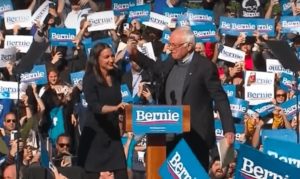
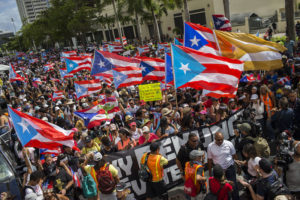
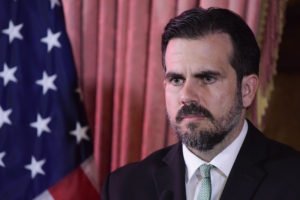
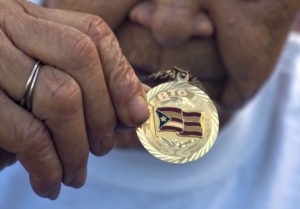
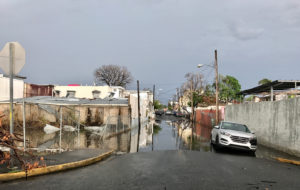
You need to be a supporter to comment.
There are currently no responses to this article.
Be the first to respond.